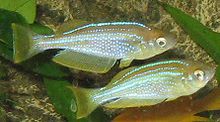Procatopodinae
Appearance
| Procatopodinae Temporal range:
| |
|---|---|

| |
| Lamprichthys tanganicanus | |
| Scientific classification | |
| Domain: | Eukaryota |
| Kingdom: | Animalia |
| Phylum: | Chordata |
| Class: | Actinopterygii |
| Order: | Cyprinodontiformes |
| Family: | Poeciliidae |
| Subfamily: | Procatopodinae Fowler, 1916[1] |
Procatopodinae is a subfamily of the family Poeciliidae, the "livebearers", in the order Cyprinodontiformes.[2] Some authorities treat this subfamily as a family, the Procatopodidae, including the banded lampeye.[3]
Subdivisions
[edit]The subfamily Procatopodinae is divided into two tribes and 11 genera:[2]
- Tribe Fluviphylacini Roberts, 1970
- Fluviphylax Whitley, 1920
- Tribe Procatopodini Fowler, 1916
- Aapticheilichthys Huber, 2011
- Micropanchax Myers, 1924
- Lacustricola Myers, 1924
- Poropanchax Clausen, 1967
- Platypanchax Ahl, 1928
- Lamprichthys Regan 1911
- Pantanodon Myers, 1955
- Hypsopanchax Myers, 1924
- Procatopus Boulenger, 1904
- Plataplochilus Ahl, 1928
- Rhexipanchax Huber, 1999
The extinct procatopodine Paralebias Gaudant, 2013 is known from the Oligocene and Miocene of Europe.[4][5]
References
[edit]- ^ Richard van der Laan; William N. Eschmeyer & Ronald Fricke (2014). "Family-group names of Recent fishes". Zootaxa. 3882 (2): 001–230. doi:10.11646/zootaxa.3882.1.1. PMID 25543675.
- ^ a b J. S. Nelson; T. C. Grande; M. V. H. Wilson (2016). Fishes of the World (5th ed.). Wiley. p. 371. ISBN 978-1-118-34233-6.
- ^ Pedro Bragança & Wilson J E M Costa (2019). "Multigene fossil-calibrated analysis of the African lampeyes (Cyprinodontoidei: Procatopodidae) reveals an early Oligocene origin and Neogene diversification driven by palaeogeographic and palaeoclimatic events". Organisms Diversity & Evolution. 19 (2): 303–320. doi:10.1007/s13127-019-00396-1. Abstract
- ^ Gaudant, Jean (2013-02-01). "Occurrence of poeciliid fishes (Teleostei, Cyprinodontiformes) in the European Oligo-Miocene: the genus Paralebias nov. gen". Neues Jahrbuch für Geologie und Paläontologie - Abhandlungen: 215–222. doi:10.1127/0077-7749/2013/0305.
- ^ Herbert Mainero, Andrea; Vasilyan, Davit; Reichenbacher, Bettina (2024-12-31). "Two new genera of killifish (Cyprinodontiformes) from the Middle Miocene of the Bugojno Basin, Bosnia and Herzegovina: insights into the lost diversity of Valenciidae". Journal of Systematic Palaeontology. 22 (1). doi:10.1080/14772019.2024.2412539. ISSN 1477-2019.
